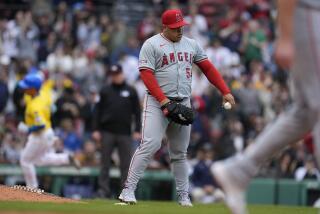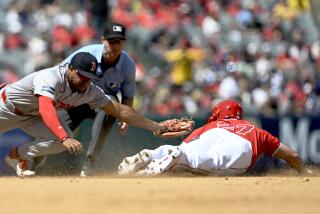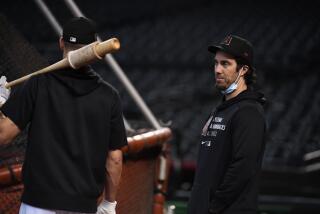Angels can go only as far as starting pitchers take them

Superb starting pitching can carry a team to a World Series title, as the Chicago White Sox showed in 2005, when Jose Contreras, Mark Buehrle, Jon Garland and Freddy Garcia combined for a 9-1 record and a 2.84 earned-run average, four complete games and nine quality starts during an 11-1 postseason run.
The Angels don’t need to replicate that kind of performance to play deep into October, but they’ll need competent starting pitching to keep them in the game long enough to turn things over to a dominant bullpen.
In Game 1 starter Jered Weaver, the Angels can trust. The veteran right-hander is not overpowering, but his ability to change speeds and command a wide array of pitches and his pitbull mentality has made him one of baseball’s most effective starters for eight years.
Beyond Weaver, who is 2-1 with a 2.61 ERA in six post-season games, there are more question marks than exclamation points.
Left-hander C.J. Wilson was erratic in September and has struggled in the postseason, going 1-5 with a 4.82 ERA in 10 games for Texas in 2010-11, giving up 10 home runs, striking out 43 batters and walking 29 in 52 1/3 innings.
If he throws a dud as he did Sept. 22, when he gave up six runs and four hits, and walked four in two-thirds of an inning of an 8-4 loss to Oakland, the Angels will have no chance.
Matt Shoemaker helped ease the loss of Garrett Richards and Tyler Skaggs to season-ending injuries, but the right-hander hasn’t pitched since Sept. 15 because of a mild left rib-cage strain. He is scheduled to start Game 2.
And swingman Hector Santiago was as inconsistent as Wilson in September, giving up 10 earned runs in three innings of losses to Houston and Texas before rebounding to throw 51/3 scoreless innings against Oakland on Sept. 24.
The hitters could ease the pressure on the rotation by scoring early, and to do so they’ll have to end a mini-funk in which they scored five runs in the final three regular-season games.
Leadoff man Kole Calhoun, who closed the season in a four-for-33 slide, could be key. When he’s on base, it will provide run-producing opportunities for the middle of the order and make it tougher for opponents to pitch carefully to Mike Trout and Albert Pujols.
The bullpen is so deep that if the starters get through five, maybe even four, innings with a lead, the Angels will be in good shape.
The Angels must contain or slow the running game of the Royals, who led the major leagues with 153 stolen bases and swiped seven bags in Tuesday night’s wild-card victory over the A’s.
Weaver has an excellent pick-off move, and having the left-handed Wilson should help. Catchers Chris Iannetta and Hank Conger improved this season by catching 27% of would-be stealers, up from 21% last season, but the Angels still ranked 17th in caught-stealing percentage in 2014.
Jarrod Dyson (36 stolen bases) and Alcides Escobar (31) are among the fastest Royals, and Terrance Gore is a lethal late-inning pinch-running weapon if he is on the division series roster.
“You saw what they can do in the game [Tuesday] night, where they had seven stolen bases and five of them scored,” Weaver said. “You just try to mix up times to the plate, try to mix up how long you hold the ball for, just the little things to try to put a damper in their running game as much as possible.”
More to Read
Go beyond the scoreboard
Get the latest on L.A.'s teams in the daily Sports Report newsletter.
You may occasionally receive promotional content from the Los Angeles Times.







